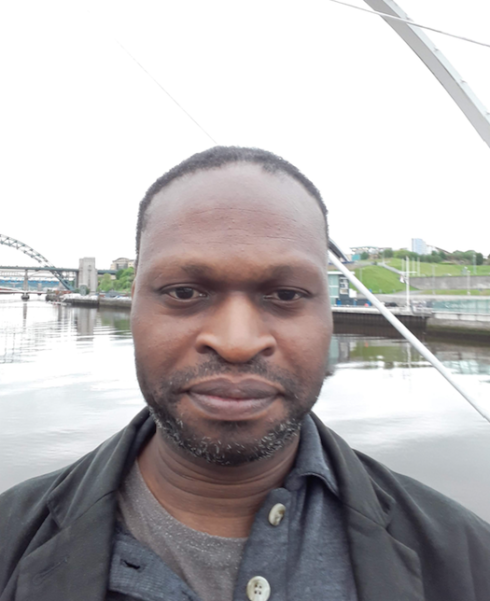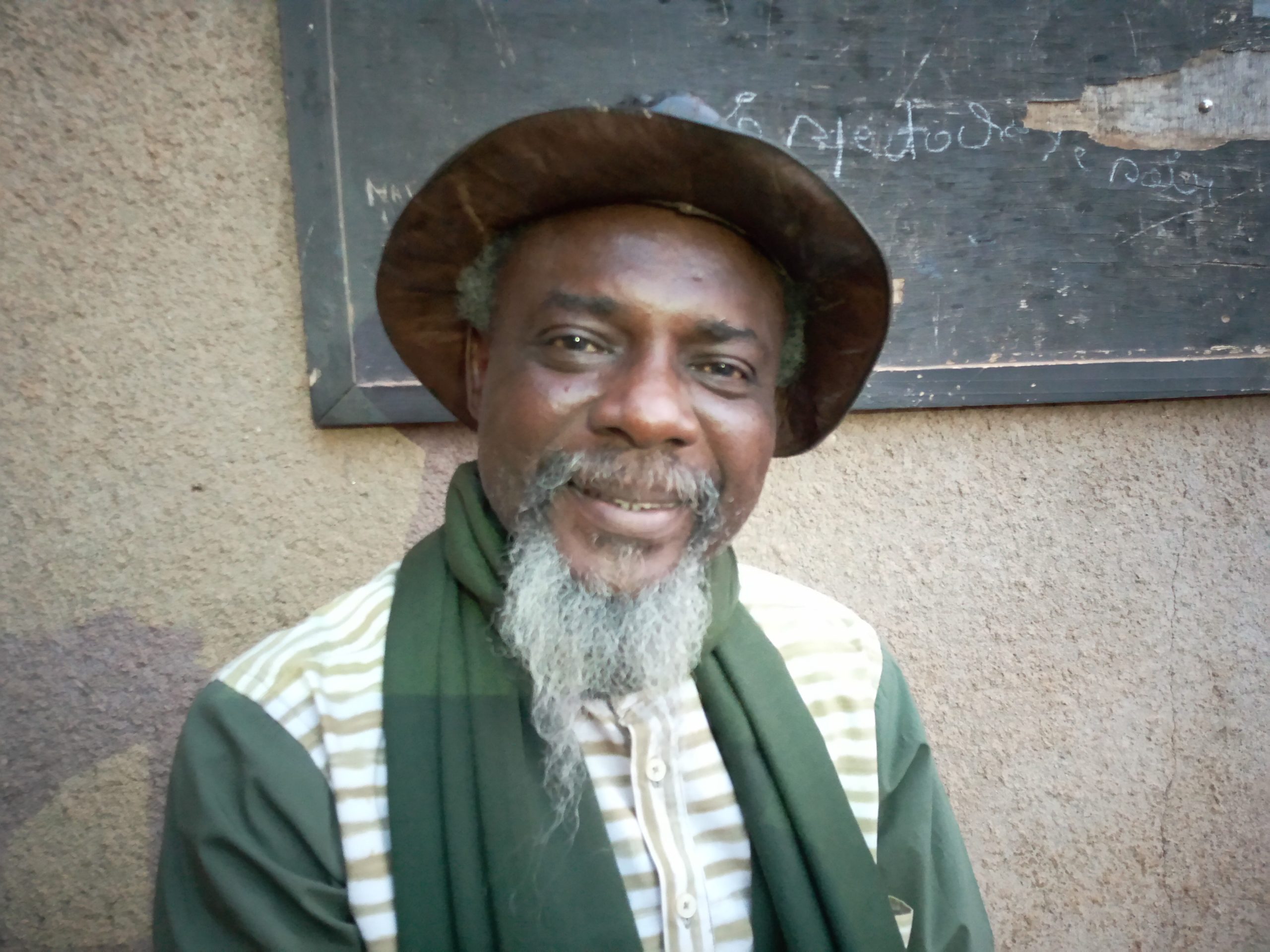

Für #StepTwo haben wir in Zusammenarbeit mit Annette Bühler-Dietrich (Universität Stuttgart), Julia Augart und Nelson Mlambo (University of Namibia) Schriftsteller:innen aus Burkina Faso, Eritrea, Kongo, Mauritius, Namibia, Nigeria, Somalia, Togo und Uganda eingeladen.

Oladipo Agboluaje
„I am a playwright and tutor of playwriting and post-colonial performance. I am based in the UK but I love writing plays set in Nigeria that are written for a Nigerian audience. That means the language, content and conventions are devised primarily for an audience that possesses what drama scholar Susan Bennett terms a ‘horizon of expectations’, where the audience members possess contextual knowledge of a performance and its aesthetics.
In this case, the horizon of expectations is different from the normative, white, middle class, theatre-going, UK audience. I choose to write with a Nigerian audience in mind because I believe that universality comes from being specific. An audience member might not be conversant with the peculiarities of a setting’s political and cultural landscape but through dramatic action, character motivation and story arc, they can follow a character through a story to understand and identify with their actions.
What this does is refuse to adapt the script to the perspective (and preconceived notions) of a predominantly white audience. It rejects the imposition of their conventional thinking on the text. The performance of the text, combined with the response of black audience members, allows for a different form of engagement, it dispossesses the dominant audience of a knowledge described by Chinua Achebe as ‘I know My Africa’. It puts the power of interpretation in the hands of the marginalized audience.“

Penda Diouf
„I am a woman, a playwright, and an Afro-descendant. I live in France. Questions linked to the colonial, to domination relations, and to eco-feminism interest me. But most of all I like to tell stories.
Africa is such a vast and diverse continent that it is difficult to give an overview of all that it represents to me. I can however say that it is the land of my ancestors and that I need to return regularly to Senegal or Ivory Coast to recharge my batteries. And the few geographical areas I know in Africa have nothing to do with the image given by the media of the continent.“

Foto: Horst Tappe / Suhrkamp Verlag
Nurrudin Farah
„I was born in Baidoa, Somalia, and did much of my schooling in Ethiopia and then Somalia, attended universities in India and in England. I am the author of several plays and novels, reside in Cape Town and teach at Bard College in upstate New York in the fall semester.
In all my life, I have lived in Africa, because the sounds, the smells, the people, everything about Africa gives me comfort and I feel inspired and write a lot better when I am on the continent. As the ancient Roman proverb has it, ‚Out of Africa there is something new and marvellous.‘ I want to be at home, in Africa, when the ‘new thing’ is revealed, so I can catch it.“

Jennifer Makumbi
„Ich bin eine Schriftstellerin aus Uganda. Mein erstes Buch, ‚Kintu‘, ist ein historischer Roman. Das zweite ist eine Sammlung von Kurzgeschichten aus der Zeit der Diaspora, ‚Manchester Happened‘. Mein drittes, „The First Woman“, ist ein feministischer Roman und erscheint dieses Jahr.
Afrika ist Zuhause. Es ist ein Ort der Liebe, der Schönheit, des Essens, der Musik, des Tanzes, der Fantasie und der großen Familien. Aber es ist auch ein Ort des Schmerzes, der Absurditäten, der Verschwendung und der schieren Frustration. Afrika wurde von Nicht-Afrikaner:innen falsch beschrieben, falsch dargestellt und falsch verstanden.“

Foto: Georges Tekou
Ildevert Méda
„I am an artist, playwright, stage director, and actor. I am the director of a theatre company called théatr’Evasion created in 1996. Nowadays, I spend most of my time giving workshops on playwriting, acting, and staging pieces. I am often asked by the government of Burkina Faso to contribute to projects that involve teaching arts and culture in schools.
To me, ‚Africa‘ means the future of humanity. That is why I decided to set up here in Africa and develop all my work. When I watch out to see how the world goes, I notice that most of the human values are being lost and forgotten because of a sort of permanent search for material accumulation and self-power. Unfortunately, I see that Africa itself does not seem to be aware of its own qualities, Africa itself seems to be running after the other continents’ position without considering the price for it: the loss of its humanity.
That is why I feel myself and other artists to be useful in getting Africa to become conscious of some of its values throughout our artistic work.“

Rémi Ngamije
„I am a Rwandan-born Namibian writer and photographer. My debut novel ‚The Eternal Audience Of On‘ is forthcoming from Scout Press (S&S). I write for brainwavez.org, a writing collective based in South Africa. I am the editor-in-chief of Doek!, Namibia’s first literary magazine. My short stories have appeared in Litro Magazine, AFREADA, The Johannesburg Review of Books, The Amistad, The Kalahari Review, American Chordata, Doek!, Azure, Sultan’s Seal, Columbia Journal, and New Contrast. I have been longlisted for the 2020 Afritondo Short Story Prize and shortlisted for Best Original Fiction by Stack Magazines in 2019. More of my writing can be read on my website: remythequill.com
What does ‘Africa’ mean to me? There is no single answer to this question because the meaning changes day by day, and sometimes, from hour to hour.
Personally, the simplest iteration of Africa is this: home. But even that is a contentious label. However, it is that to me: home – a place of shelter and security, a place of origin, a place to be from, a place to return to.
It can be seen that all of these are nebulous and shifting concepts, but if they defy rigid explanation and categorisation, it is only because they are like the very concept they are trying to explain – Africa is more than the landmass, more than its people. It is a thing in constant motion and progress. This is what home means to me, and this is what Africa means to me.“

Sylvia Schlettwein
„I was born on 16 November 1975 in Omaruru in Namibia. I grew up in Namibia and studied German and French Literature and Language in Cape Town, Stuttgart, and Lyon. I write in English, German, and Afrikaans. I am known for my Namibian take on the short story and speculative fiction and reflections on multilingual writing. I live, love, work, and write in Windhoek, where I teach and am involved in various literary projects.
Africa is my home, my castle, my roots, my wings, my wounds, my healing, my blood, sweat, and tears, my quicksand and rock, my cradle and bed, my silence and voice, my happy place and the eye of my storm, … the list goes on.“

Sami Tchak
„Mon nom est Sami Tchak, pseudonyme de Sadamba TCHA-KOURA, je suis né au Togo en 1960. Après une licence de philo- sophie dans mon pays et une thèse de sociologie soutenue en 1993 à La Sorbonne-Paris V, je me consacre depuis quelques années à l’écriture. Parmi mes publications, citons „Place des Fêtes“ (2001; dt. „Scheiß Leben“, 2004) „Hermina“ (2003), „La fête des masques“ (2004), „Le paradis des Chiots“ (2006), „Filles de Mexico“ (2008), „Al Capone le Malien“ (2011), „La couleur de l’écrivain“ (2014), „Ainsi parlait mon père“ (2018), „Les fables du moineau“ (2020). Je vis en France depuis 1986.
L’Afrique, ce continent où se trouve mon pays, le Togo, est pour moi une évidence mais aussi le lieu de mes multiples ignorances. Évidence, parce que je suis un Africain, je suis issu de ce continent. Lieu de mes multiples ignorances parce qu’il s’agit d’un vaste continent avec 56 États et des centaines de peuples qui ont des cultures ne se ressemblant pas sur tous les points.
L’Afrique, c’est mon continent, mais c’est dans des livres, dont beaucoup écrits par des Occidentaux, que j’ai appris à la connaître un tout petit peu. Mes nombreux voyages dans au moins 20 pays africains m’ont aussi apporté un supplément d’impressions.
L’Afrique, c’est le continent d’où je viens, mais jusqu’à la fin de ma vie, elle sera pour moi une réalité que je connaîtrai seulement par fragments.
Ainsi, je ne dirai pas ‚Chez nous en Afrique‘. Même mon petit village est d’une grande complexité qu’il me faudrait toute une vie pour tenter de comprendre.“

Foto: Silvia Disch
Julia Augart
„Ich bin Lektorin an der University of Namibia und lehre dort deutsche Sprache und Literatur.
‚Afrika‘ ist einer der vielfältigsten und aufregendsten Kontinente für mich, der leider häufig auf ‚Afrika‘ reduziert wird. Seine Vielfältigkeit und Komplexität werden meistens ignoriert und in den Medien auf Bilder von Armut und Kriminalität und in Romanen und Filmen auf romantische Klischees reduziert.
Aus meiner Sicht bietet jedes afrikanische Land seine eigene, einzigartige multikulturelle und mehrsprachige Landschaft, die ich unter anderem durch seine vielfältige Literatur erforsche.“

Annette Bühler-Dietrich
„Ich bin außerplanmäßige Professorin für Neuere deutsche Literatur an der Universität Stuttgart und unterrichte unter anderem Seminare zu Kolonialliteratur, Migration und dekolonialer Theorie. Seit 2010 lehre ich auch an der Université Ouaga I Joseph Ki-Zerbo, Burkina Faso, und übersetze Theaterstücke aus dem Französischen. Von 2012 bis 2018 habe ich in Burkina Faso gelebt.
Als ich 2010 zum ersten Mal für einen Lehraufenthalt hinreiste, wollte ich für mich eine Beziehung zwischen der postkolonialen Theorie und dem Leben vor Ort herstellen, einem Leben, dem ich ohne vorgefasste Bilder zu begegnen versuchte. In Ouagadougou traf ich auf eine pulsierende Theaterszene und auf Studierende der Germanistik, die den Wissensaustausch suchten.
‚Afrika‘ ist für mich ein fortdauernder Lernprozess, in dem ich Traditionen, Rituale, Sprachen und Codes zu verstehen suche und Wissensformen und Werte mit Freund:innen, Künstler:innen, Kolleg:innen und Studierenden verhandle. Burkina Faso ist für mich auch ein Zuhause.“

Nelson Mlambo
„Ich bin Dozent im Fachbereich ‚Sprache und Literaturwissenschaft‘ in der Abteilung ‚Englisch‘ an der University of Namibia, wo ich mit Freude Vorlesungen zu afrikanischer, südafrikanischer und namibischer Literatur halte.
‚Afrika‘ steht für mich für die Vitalität der Bevölkerung, die kulturelle Vielfalt und Kontraste, für den Regenbogenkontinent, auf dem verschiedene Völker zusammen leben, für Ubuntu-Philosophie und vor allem für die Widerstandsfähigkeit der Bevölkerung. Mich faszinieren auch Darstellungen und Kritik an Afro-Euphorie und Afro-cli-fi (Literatur, die sich mit dem Klimawandel auseinandersetzt) in der afrikanischen Literatur.“
Schreibe einen Kommentar
Du musst angemeldet sein, um einen Kommentar abzugeben.